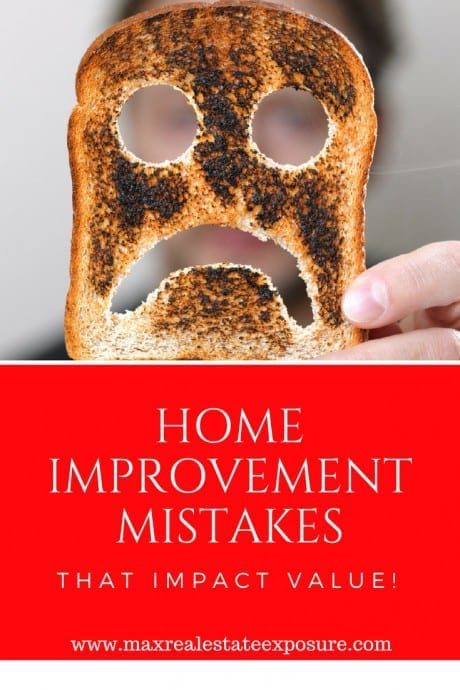Home Renovation Mistakes That Can Cost You
 Are you planning on renovating your home?
Are you planning on renovating your home?
Did you know there are improvements that you make to your home that can lower its value?
Do you know how often I have seen clients make mistakes renovating a house over my career? The answer is quite a few!
Part of the fun and satisfaction of owning a home comes from renovations – it’s your house, and you can make it exactly as you want.
Unfortunately, some homeowners get caught up in renovating their homes and fail to consider what those changes will do to the property’s resale value.
You have every right to turn your house into an ideal dwelling for yourself, but you should keep a few things in mind if you ever plan on selling the home.
If you intend on selling shortly, it’s imperative to understand what home improvements can lower your value.
Before dishing out any money on a renovation with expectations that it will add value to your home, consider the long-term implications.
Consider The Resale Value When Renovating a Home
If your home renovations fall into any of the following areas, you may wind up spending more than you will ever get back when you sell.
You may be thinking to yourself that the purpose of making these changes to your home has nothing to do with resale value and everything to do with personal enjoyment.
While that is perfectly acceptable, don’t forget this when it comes time to sell your place.
Many homeowners incorrectly believe that every home improvement they make to their property returns to them an increased value.
This is not the case, and in fact, there are things you can spend money on that not only don’t add value but can make your place harder to sell. The goal should be to make value-added improvements.
So while your intentions of making home renovations have nothing to do with the resale value, don’t forget this when it comes time to sell your home.
Home Renovations Standing Out Too Much
The households in the surrounding area have much to do with your property’s market value. Nearby homes impact value no matter how much you invest in your house.
Understandably, you want to make your home as beautiful as possible, but you risk resale problems when you upgrade too extravagantly. You may not get your money back if the renovation exceeds your area’s standard.
For instance, if you were to install an elaborate in-ground swimming pool on your property for $125,000 while everyone else in the neighborhood makes do with a lawn, you may not make all that money back when you sell. If all the other houses sell for around $500,000, do not expect to move yours for $625,000 or more because you have the pool.
Real Estate experts will always tell you it is best to be the lowest-priced home in the neighborhood because all the other more expensive homes will bring up the lower-priced home’s value. Just the opposite occurs when you over-improve for the area.
Above Ground Pool
 Since we are discussing swimming pools, this particular “home renovation” must be mentioned.
Since we are discussing swimming pools, this particular “home renovation” must be mentioned.
A pool is, in fact, one of the top home improvement mistakes owners make. An above-ground pool may provide lots of fun for the kids or perhaps even for you but do not expect it to add value to your home.
Even the top of the line versions is still considered undesirable for most any home buyer. These are considered so unsightly that they can lower your home’s value because most customers will calculate the cost of their removal into an offer.
If you have one of these and enjoy it, you can continue to do so. However, if you decide to sell, it is probably best to have the pool removed and new sod put down before you put the house up on the market, especially if the pool is not new.
No Building Permits For Renovating a Home
Depending on where you live, you may be able to get away with renovations or additions to your home without a building permit. However, this is not the case for many and could cause severe headaches when you sell your home.
Realtors and buyers may balk at a house that does not meet regulations for a good reason.
Insurance companies will look for any way to avoid paying for a claim, and a lack of proper permits is the perfect excuse.
Not having permits can cause lenders and appraisers to consider your home less valuable and may even make it worth less than when you started.
Ensure that you apply for a permit with the local building inspector’s office whenever you add on an addition or make significant improvements to mechanical systems such as plumbing or electrical.
Not having the proper permits is a home renovation mistake I have seen come back to haunt sellers when it comes time to sell. Not pulling permits is a blunder that should be avoided at all costs.
You will end up dealing with unpermitted work when selling and going through the legalization process.
Inconsistency When Remodeling a House
When buyers look at a home, they usually consider the whole package. Consistency in your renovations is crucial because they may not be willing to pay more for an over-the-top addition to your home.
Some homeowners get caught up in adding the perfect kitchen or ensuite bathroom and fail to see that the rest of their home only looks worse.
I’m not saying that you should avoid improving your kitchen – just keep in mind that dumping your entire improvement fund into a single area could cause an imbalance, something buyers are unwilling to pay for.
Spreading the money on home remodeling projects might yield more rewards when trying to sell.
The perfect example is the homeowner who installs a new kitchen complete with gorgeous cabinetry, granite counters, and stainless appliances but leaves the linoleum floor that was installed twenty years ago.
It stands out like a sore thumb and negates much of what you have done to improve your home. The same could be said if your adjoining dining room has shag carpet or worn-looking hardwood floors.
Remember to make the investments in your home consistent. Renovating a home should not be a rag-tag, jumbled mess.
Avoid Shoddy DIY Home Renovations
 Do-it-yourself projects can be fun and rewarding but can also negatively affect your home’s value.
Do-it-yourself projects can be fun and rewarding but can also negatively affect your home’s value.
Crooked tiles in the bathroom and unreliable wiring in the finished basement would not be selling points, even if they were learning experiences for you.
Most of the time, it pays to bring in a professional to do your renovations. This way, the additions you make to your home will add value.
Don’t think this matters, and nobody will figure it out? This is one of the first things a good home inspector will observe.
Most home inspectors will immediately be able to notice do-it-yourself work from that of a professional.
It is an obvious mistake to make home improvements you are not qualified to do. Poor quality workmanship on intended enhancements can quickly decrease a home’s value!
Don’t Be Too Trendy When Renovating a House
There are classic choices, and there are trendy options. Classic is usually the safer bet for people interested in selling their homes – at least if you want to get back the money you spent on the renovations.
Shag carpet was all the rage, but now it is almost unsellable in a home. Avoid the styles of the moment to add lasting value to your home.
I can’t tell you the number of times a home seller has given me a list of things done to their home, some very expensive that add no value. Why? They were not acceptable improvements to the masses but to the seller’s tastes.
In many cases, the money you spend on your house has nothing to do with what you eventually sell it for.
Avoid Color Obsessions When You Renovate a House
 It is your home; you can paint it whatever color you like. However, to get the best price on your home, you should have a fallback paint plan before you put it up on the market.
It is your home; you can paint it whatever color you like. However, to get the best price on your home, you should have a fallback paint plan before you put it up on the market.
Lighter, more neutral colors – think off-white and light gray – appeal more to potential buyers than anything else out there.
Your child’s room may be bright purple, and your art room may be neon yellow, but you should be ready to change them back before you begin the sale process.
If you can’t stand the thought of any off-white, then choose colors that are “earth tones.”
A large percentage are attracted to light shades of gray and brown. Use these colors to spruce up your home, and you will be happy with the results they bring.
Many People Cannot See Past Paint Colors
If you think it is just painting, and any buyer can look past my colors, you don’t understand the psychology of selling.
I would be the first person to put up my hand and agree with your thinking if I had not been in the real estate business for the last thirty-seven years and seen firsthand how loud colors can stop a home from selling.
While listing Holliston Real Estate a few years back, there was a particular home I was marketing that was just gorgeous. It had everything a buyer could want except one thing.
The two-story foyer was bubblegum pink! Every buyer that walked into the home hated it. Unfortunately, it was the first thing every buyer looked at when they opened the front door. It left a lasting impression, but not in a positive way.
After months and months of the seller saying, ” The buyer can change it if they don’t like it,” they finally agreed to change the color to an off-white.
Within two weeks, I had an offer on the home that the seller accepted. They were shocked. They could not wrap their head around a buyer not looking past a paint color.
The problem with this thinking is that many buyers can not visualize. Sellers with this ability don’t understand how this could stop a sale. Folks, it can, and it does.
Making Your Home Renovations Too Personal
One of the beautiful things about owning a home is that you can do practically anything you want with it, including making it unusable for future owners. If you never cook, for example, and tear out the entire kitchen because of this, you will affect the value of your home.
Everyone is looking for a kitchen, making your property an unthinkable purchase for 90 percent of buyers.
While this is an extreme example, in my thirty-seven years as a Real Estate professional, I have seen a lot of strange things done to people’s homes.
While making your house your own is wonderful, be aware of future consequences and the most money in your pocket!
Other Mistakes When Making Home Renovations
 While the above items are design choices, you can make other mistakes when renovating a house.
While the above items are design choices, you can make other mistakes when renovating a house.
Here are things you will want to avoid:
Under Estimating Home Renovation Costs
Budgeting properly is one of the most challenging things when renovating your home. Most people will go over their budget – some in a significant way.
It would be best if you planned on more than you expected. You’ll inevitably see things you want in your home that cost more.
It is similar to buying a new construction home. The upgrades will be hard to resist when they are presented to you.
Hiring The Wrong Contractors For Your Home Remodeling
When you are not in the building industry, making bad contractor choices happen. Like everything else, it is essential to do proper due diligence for who will do your property renovations.
Choosing the wrong contractor can be a nightmare because contractors often depend on one another.
When a contractor doesn’t show up or do what they say, there is another sub-contractor behind them that will be impacted.
Skipping Out On Getting References From Other Customers
When you are making a significant renovation to your house, it is always wise to get references. Try to speak to a few of the builder’s past customers.
Skipping this step could lead to unexpected problems.
Choosing The Lowest Renovation Estimate
Sometimes picking the wrong contractor goes hand-in-hand with selecting the lowest bid. While it can be tempting to try to save money, there is often a reason why some contractors are lower than others.
Ensure that any work that is being quoted is apples to apples. Sometimes, a bid is lower because they are cutting corners and not doing the job as other contractors would.
Thing All Your Renovations Will Go As Expected
Unfortunately, things rarely ever go according to plan in the construction industry. Whether it is a subcontractor not showing up when their expected or a vendor ordering the wrong material, things happen unexpectedly.
Murphy’s law in home renovations applies, like many other things in life.
Not Following a Timeline to Make Essential Decisions
When remodeling a house, the contractor will ask you how you want things done. It is your job to make timely selections with vendors. When you don’t, the time to finish the project can be significantly delayed.
As mentioned, each contractor can depend on another to finish their work.
Not Knowing Dimensions and Sizes
It is imperative to know how to measure square footage in your home. Whether you are measuring a room or a specific amount of flooring, you’ll need.
Knowing room sizes also becomes essential when you are buying new furniture. Many people who renovate beautiful homes want to swap old furniture for something new. It becomes necessary to calculate whether it will work or not.
Some will buy furniture that is too large or rugs that are too small. When you do, these rooms will look out of proportion.
Final Thoughts on Renovating a Home
Home remodeling projects can either be a fun experience or your worst nightmare. It often depends on your planning, due diligence, and the quality of the contractors hired.
If you wing it, you’ll likely end up unhappy.
Other Articles on Renovating a House
Should I remodel my house or move – see considerations for deciding between remodeling your home or moving to a new place.
About the author: Bill Gassett, a nationally recognized leader in his field, provided the above Real Estate information on avoiding mistakes when renovating a home. Bill can be reached via email at billgassett@remaxexec.com or by phone at 508-625-0191. Bill has helped people move in and out of Metrowest towns for the last 37+ Years.
Are you thinking of selling your home? I am passionate about Real Estate and love sharing my marketing expertise!
I service Real Estate sales in the following Metrowest MA towns: Ashland, Bellingham, Douglas, Framingham, Franklin, Grafton, Holliston, Hopkinton, Hopedale, Medway, Mendon, Milford, Millbury, Millville, Northboro, Northbridge, Shrewsbury, Southboro, Sutton, Wayland, Westboro, Whitinsville, Worcester, Upton, and Uxbridge MA.

